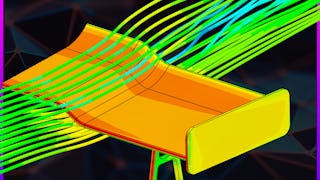Filter by
SubjectRequired
LanguageRequired
The language used throughout the course, in both instruction and assessments.
Learning ProductRequired
LevelRequired
DurationRequired
SkillsRequired
SubtitlesRequired
EducatorRequired
Explore the Mechanics Course Catalog
 Status: Preview
Status: PreviewGeorgia Institute of Technology
Skills you'll gain: Engineering Analysis, Mechanics, Torque (Physics), Engineering Calculations, Mechanical Engineering, Engineering, Civil Engineering, Structural Analysis, Applied Mathematics, Trigonometry
 Status: Free Trial
Status: Free TrialRice University
Skills you'll gain: Mechanics, Torque (Physics), Physics, Problem Solving, Mechanical Engineering, Engineering Calculations, Calculus, Engineering Analysis, Physical Science, Mathematical Modeling, Algebra, Applied Mathematics, Geometry, Trigonometry
 Status: Preview
Status: PreviewUNSW Sydney (The University of New South Wales)
Skills you'll gain: Mechanics, Physics, Experimentation, Engineering Calculations, Applied Mathematics, Physical Science, Systems Of Measurement, Engineering Analysis, Mathematical Modeling, Estimation
 Status: Free Trial
Status: Free TrialUniversity of Colorado Boulder
Skills you'll gain: Estimation, Linear Algebra, Physics, Engineering Calculations, Applied Mathematics, Advanced Mathematics, Mathematical Modeling, Engineering Analysis, Calculus, Differential Equations, Physical Science
 Status: Preview
Status: PreviewGeorgia Institute of Technology
Skills you'll gain: Structural Analysis, Mechanical Engineering, Failure Analysis, Engineering Analysis, Mechanics, Materials science, Engineering Calculations, Civil Engineering, Mathematical Modeling, Trigonometry

Coursera Project Network
Skills you'll gain: Simulation and Simulation Software, Engineering Analysis, Engineering, Prototyping, Computer-Aided Design, Cloud Computing
What brings you to Coursera today?
 Status: Free Trial
Status: Free TrialISAE-SUPAERO
Skills you'll gain: Mechanics, Thermal Management, Mechanical Engineering, Hazard Analysis, Physical Science, Simulations, Applied Mathematics, Systems Of Measurement, Vibrations, Engineering Analysis, Control Systems, Engineering Calculations, Physics, Energy and Utilities, Mathematical Modeling
 Status: Preview
Status: PreviewGeorgia Institute of Technology
Skills you'll gain: Structural Analysis, Structural Engineering, Engineering Analysis, Mechanical Engineering, Mechanics, Engineering
 Status: Free Trial
Status: Free TrialUniversity of Colorado Boulder
Skills you'll gain: Quantitative Research, Engineering Calculations, Mechanical Engineering, Numerical Analysis, Chemistry, Physics, Simulation and Simulation Software, Mathematical Modeling, Differential Equations
 Status: Free Trial
Status: Free TrialNorthwestern University
Skills you'll gain: Machine Controls, Control Systems, Automation Engineering, Mathematical Modeling, Mathematical Software, Simulation and Simulation Software, Engineering Calculations, Engineering, Mechanics, Mechanical Engineering, Artificial Intelligence, Applied Mathematics, Engineering Analysis, Automation, Virtual Environment, Robotic Process Automation, Torque (Physics), Graph Theory, Matlab, Numerical Analysis
 Status: Free
Status: FreeÉcole normale supérieure
Skills you'll gain: Sampling (Statistics), Physics, Simulations, Computational Logic, Numerical Analysis, Markov Model, Quantitative Research, Algorithms, Applied Mathematics, Linear Algebra, Integral Calculus
 Status: Free Trial
Status: Free TrialUniversity of Colorado Boulder
Skills you'll gain: Linear Algebra, Physics, Applied Mathematics, Advanced Mathematics, Mathematical Modeling, Engineering Analysis, Differential Equations, Physical Science
In summary, here are 10 of our most popular mechanics courses
- Introduction to Engineering Mechanics: Georgia Institute of Technology
- Introduction to Mechanics: Rice University
- Mechanics: Motion, Forces, Energy and Gravity, from Particles to Planets: UNSW Sydney (The University of New South Wales)
- Quantum Mechanics for Engineers: University of Colorado Boulder
- Mechanics of Materials I: Fundamentals of Stress & Strain and Axial Loading: Georgia Institute of Technology
- Computational Fluid Mechanics - Airflow Around a Spoiler: Coursera Project Network
- Fundamentals of Flight mechanics: ISAE-SUPAERO
- Applications in Engineering Mechanics: Georgia Institute of Technology
- Quantum Mechanics: University of Colorado Boulder
- Modern Robotics: Mechanics, Planning, and Control: Northwestern University










